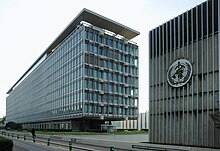**Establishment and History:**
– The International Sanitary Conferences began in 1851, focusing on diseases like cholera, bubonic plague, yellow fever, and tuberculosis.
– The Health Organization of the League of Nations was established post-World War I.
– WHO was established in 1946 with the signing of its constitution by 51 UN countries.
– G. Brock Chisholm was appointed as the first director-general of WHO.
– Initial priorities included controlling malaria, tuberculosis, and improving maternal and child health.
**Mandate, Functions, and Achievements:**
– WHO is responsible for international public health under the UN, setting health standards, and collecting global health data.
– Priorities include eradicating diseases like smallpox, near-eradicating polio, and developing vaccines like for Ebola.
– Focus areas include HIV/AIDS, malaria, tuberculosis, heart disease, and cancer.
– WHO promotes universal health coverage, monitors public health risks, and coordinates health emergency responses.
– Achievements include contributing to a 40% decline in tuberculosis deaths between 1990-2010.
**Governance and Funding:**
– WHO is governed by the World Health Assembly, comprising 194 member states.
– The Assembly elects a 34-member executive board and the director-general.
– WHO’s budget for 2020-2021 was over $7.2 billion, primarily from member state contributions and private donors.
– The approved budget for 2022-2023 is over $6.2 billion.
– Governance structure ensures oversight and funding for WHO’s operations.
**Operational History and Program Initiatives:**
– WHO established various programs like the Global Polio Eradication Initiative in 1988 and the Global Programme on HIV/AIDS in 1986.
– Initiatives like the Expanded Programme on Immunization and Special Programme for Research and Training in Tropical diseases were launched in the 1970s.
– WHO’s operational history includes efforts like mass tuberculosis inoculation drives and malaria control programs.
– WHO’s work includes creating lists of essential medicines and setting global health goals.
– WHO’s operational initiatives aim to address global health challenges effectively.
**Health Policies, Emergency Response, and Global Initiatives:**
– WHO’s Constitution aims for the highest level of health for all people and outlines roles in directing international health work.
– WHO’s emergency response includes the formation of the World Health Emergencies program and recommendations for a Global Health Emergency Council.
– Global initiatives include the Global Polio Eradication Initiative, Stop TB Partnership, and Measles Initiative.
– WHO’s health policies cover prevention of diseases, accidents, environmental hygiene, and collaboration with various organizations.
– WHO’s response to emergencies like the COVID-19 pandemic highlights the organization’s role in global health crises.
The World Health Organization (WHO) is a specialized agency of the United Nations responsible for international public health. It is headquartered in Geneva, Switzerland, and has six regional offices and 150 field offices worldwide.
 | |
 The headquarters in Geneva was designed by Jean Tschumi and inaugurated in 1966. | |
| Abbreviation | WHO |
|---|---|
| Pronunciation |
|
| Formation | 7 April 1948 |
| Type | United Nations specialized agency |
| Legal status | Active |
| Headquarters | Geneva, Switzerland 46°13′56″N 06°08′03″E / 46.23222°N 6.13417°E |
Head | Tedros Adhanom Ghebreyesus (Director-General) |
Parent organization | United Nations Economic and Social Council |
Budget | $7.96 billion (2020–21) |
| Website | who.int |
The WHO was established on April 7, 1948, and convened its first meeting on July 24 of that year. It incorporated the assets, personnel, and duties of the League of Nations' Health Organization and the Paris-based Office International d'Hygiène Publique, including the International Classification of Diseases (ICD). The agency's work began in earnest in 1951 after a significant infusion of financial and technical resources.
The WHO's official mandate is to promote health and safety while helping the vulnerable worldwide. It provides technical assistance to countries, sets international health standards, collects data on global health issues, and serves as a forum for scientific or policy discussions related to health. Its official publication, the World Health Report, provides assessments of worldwide health topics.
The WHO has played a leading role in several public health achievements, most notably the eradication of smallpox, the near-eradication of polio, and the development of an Ebola vaccine. Its current priorities include communicable diseases, such as HIV/AIDS, Ebola, malaria and tuberculosis; non-communicable diseases such as heart disease and cancer; healthy diet, nutrition, and food security; occupational health; and substance abuse. The agency advocates for universal health care coverage, engagement with the monitoring of public health risks, coordinating responses to health emergencies, and promoting health and well-being generally.
The WHO is governed by the World Health Assembly (WHA), which is composed of its 194 member states. The WHA elects and advises an executive board made up of 34 health specialists; selects the WHO's chief administrator, the director-general (currently Tedros Adhanom Ghebreyesus of Ethiopia); sets goals and priorities; and approves the budget and activities. The WHO is funded primarily by contributions from member states (both assessed and voluntary), followed by private donors. Its total approved budget for 2020–2021 is over $7.2 billion., while the approved budget for 2022–2023 is over $6.2 billion.
